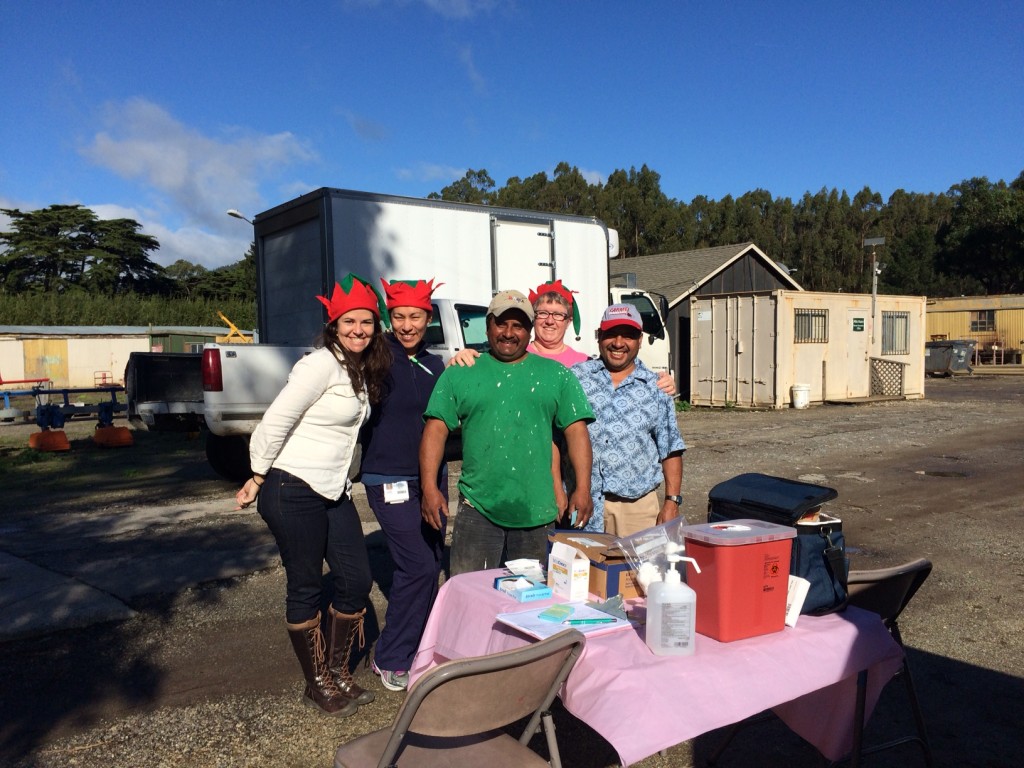The doctor is in. At last.
This Thursday, a small group of patients will inaugurate Puente’s new “Pescadero Clinic” – a converted meeting room inside a portable, now home to an exam table and some limited medical equipment.
Puente has started scheduling patients for 30-minute time slots on Thursday nights from 5-7 p.m. A doctor, a nurse, and a medical assistant from San Mateo County’s Coastside Clinic will staff the clinic each week, with the help of a Patient Services Assistance support staff person. Puente will coordinate the clinic and help provide transportation for people without cars.
The new clinic, a pilot project, is a co-initiative of Puente and the San Mateo County Health System. Its funding source is Measure A, a county sales tax that passed in November 2012. It may expand based on how well it works for local patients. For now, the clinic is equipped for primary care services, such as blood draws for lab testing, physical exams and vaccinations.
After years of watching too many South Coast residents put off their doctor’s visits (and end up in the emergency room months down the line), Puente believes that having a doctor in the neighborhood will save lives, in the literal sense. For example, the first five patients seen at the clinic have untreated diabetes and other chronic conditions.
“We’re trying to do a lot more preventative medicine so people don’t have to go to the emergency room. We want the Pescadero Clinic to be the first place people without a medical home go,” says Molly Wolfes, Community Health Coordinator for Puente.
Just like the Coastside clinic, the Pescadero clinic will serve patients with public insurance (ACE, Healthy Kids or Medi-Cal). Roughly 500 patients who reside in Pescadero, La Honda, San Gregorio and Loma Mar already have these insurances and more will likely sign up to obtain care, according to Wolfes. One day, Puente hopes that they will all use the clinic as a first resort – and forestall larger health problems down the road.
The “Pescadero Clinic” is the latest proposed solution to help solve the systemic lack of health care on the South Coast. It is an alternative option to the concept of a mobile health van to visit farms and ranches – a plan the County decided was too expensive and not flexible enough to accommodate changes in the demand for services.
The South Coast has seen mobile vans in three iterations, in 1994, 2002 and 2007. All were discontinued due to lack of funding. This is also the third time that a public health clinic has been established in Pescadero – first at Pescadero Community Church in the 1970s, then at Pescadero Elementary School in 2002.
In 2012, San Mateo County approved funding for a full-time South Coast Public Health Nurse, Karen Hackett, to work with Puente. She sees patients regularly and helps connect them with the Public Health System.

Where efforts have succeeded, it is thanks to the painstaking work of county public health workers, local volunteers, Puente staff, and groups like the South Coast Collaborative, a precursor to Puente. The level of need has never been in question.
“Our community has worked hard for two decades to find a sustainable solution to the healthcare needs of our entire South Coast community. We hope that this solution, fueled by County and local commitment, will stick,” according to Puente Executive Director Kerry Lobel. “Rural residents face a unique combination of obstacles that create disparities in health care not found in urban areas. Economic factors, cultural and social differences, transportation challenges, fears around immigration status, and the sheer isolation of living in remote rural areas conspire to impede residents of the South Coast in their struggle to lead a normal, healthy life,” Lobel said.
San Mateo County Supervisor Don Horsley, whose district covers the Coastside, says he is committed to seeing Puente and the County Health System use Measure A funding to resolve the dearth of South Coast health care once and for all. He even suggested expanding or relocating Puente within Pescadero, so as to establish a larger exam room.
“I’ve told Puente I’m committed to spending $400,000 or $500,000 a year to do whatever it takes to get real medical care out on the coast,” Horsley says, adding, “I wish we had figured this out from the very beginning. Having a clinic in there makes a whole lot more sense.”
Puente will stake the clinic’s success, in part, on the success of the Coastside Clinic in Half Moon Bay. Two Coastside Clinic staff members, Dr. Rebecca Ashe and Change Nurse Vicky Camilleri, have been instrumental in helping launch Puente’s clinic, and they will be staffing it every Thursday. They already live on the Coastside and consider Pescadero a part of their community.
“Our staff is excited to see how we can go down there and extend our services,” says Camilleri. The Coastside Clinic most recently paired up with Puente to administer a TDAP vaccine (tetanus, diphtheria and pertussis) at 18 different farms around Pescadero and a winery in La Honda.
When it comes to serving a rural population, getting signed up for health care doesn’t always ensure follow-through in seeing a doctor. In its recent community health care survey, Puente found that 40 percent of adults had not seen a doctor in the past year. Camilleri says that’s not unusual: “People sometimes are afraid and don’t know that they’re entitled to services.”
When it comes to the Pescadero clinic, she adds, “We’ll be trying to find out – what are those barriers folks may be encountering? Is it transportation? Is it a time issue? Medical coverage?”
Puente has learned that health care must be paired with outreach. Wolfes has begun distributing an info sheet, part of a campaign to get people comfortable with seeing a doctor in town. But in true Puente style, staff will be listening to what patients require and responding rather than telling them what they must do. Puente will soon launch a program to bring even more education on prevention to the region’s residents.
“We will continue to be guided by what the community needs,” says Wolfes, “and now it’s time to deliver the health care they seek – and deserve.”

